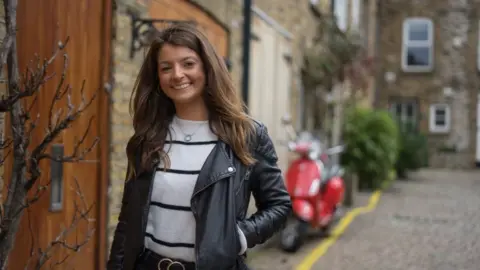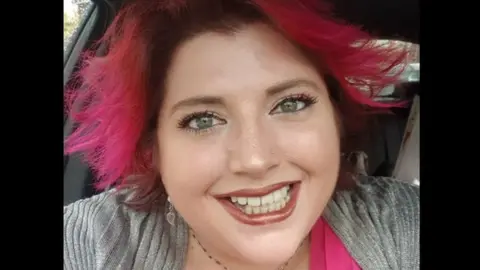Coronavirus: 'I'm high risk but made a full recovery'
 Bryony Hopkins
Bryony HopkinsFor those living with underlying health conditions, the thought of contracting coronavirus can be terrifying. But while the numbers may appear bleak, there are many people considered high risk who are making a full recovery, as I personally discovered.
Panic rose in my chest as I failed to catch my breath. All I had done was walk up the stairs. Was this Covid-19? Was it in my home, in my body, in my lungs?
I have Crohn's Disease, an autoimmune disease which means my digestive system attacks itself. It's classed as a "serious underlying health condition" at this time.
One of the main treatments is immunosuppressive therapies, drugs which reduce the strength of the body's immune system making it more susceptible to infections.
When the first coronavirus symptoms arrived - fever, tiredness - I naively thought "this doesn't feel that bad".
When you live with a chronic illness, you live with perspective. I have gone through health crises I wouldn't wish on my worst enemy - open abdominal operations, the removal of my large bowel and a few scrapes with death along the way.
So as my temperature spiked, my mind was full of questions and the horror stories I had read about. Would I end up in hospital? Would I need a ventilator? Am I going to die?
There was no opportunity to be tested, but a doctor suggested it was Covid-19. I was told to hold tight and go to A&E if my condition worsened.
After eight days, my symptoms eased. My suppressed immune system had done a good job.
I am not alone in my story. There are many people, like me, considered high risk who have made a full recovery.

"I tried to stay positive even though I was scared"
 Khadija
KhadijaKhadija, 25 from Leeds, has lived with type 1 diabetes since she was a baby. Her pancreas no longer produces insulin, so an external pump, attached to her stomach, administers it for her.
"I was really apprehensive when I heard I was in the high-risk category," she says. "I just thought, 'I could get it and what would happen if I do?' I was frightened."
Khadija lives with her mum, a nurse who comes into contact with Covid-19 patients, and four weeks ago she started to experience some of the virus symptoms.
She had "achy bones" and was "really short of breath" with chest pains and a temperature.
"I was panicking at first when I got the symptoms. I knew my immune system wasn't up to scratch.
"All over the news is the death rate, there wasn't anything about people recovering and surviving. The way I saw it was as soon as you go into hospital with it, you're not going to be coming out alive."
Paramedics were sent to her house, but they decided Khadija didn't need to go to hospital. They suggested she call 111 to arrange a test, but none were available.
"I tried to keep a positive outlook even though I was scared," she says.
A few weeks on and Khadija has made a good recovery.

"I felt safer inside"
 Freya
FreyaFeya, 37, from Manchester, lives with several chronic conditions including asthma, for which she takes steroids. Steroids are also a form of immunosuppressants and therefore make you vulnerable to the virus.
Before the lockdown, Feya felt anxious. News of the virus dominated the media and she experienced a panic attack while out shopping.
"It was the worst I've ever been," she says. "I wasn't bothered about the lockdown because I felt safer inside."
Two weeks later, Feya felt unwell with fatigue and unsteady breathing. She visited her GP who told her to self-isolate.
But she rapidly deteriorated - "I was coughing so much and struggling to breathe" and her boyfriend had to call for an ambulance.

- A SIMPLE GUIDE: What are the symptoms?
- RISK AT WORK: How exposed is your job?
- HOW A VIRUS SPREADS: An explanation
- RECOVERY: How long does it take to get better?

"They said if we could make our own way to A&E that's what we should do because they were so busy."
Feya stayed in hospital for five hours but wasn't admitted so wasn't offered a Covid-19 test. Her symptoms persisted for another two weeks, including a second ambulance call-out, and she felt completely drained of energy for weeks, but slowly she recovered.
"I went outside for the first time in two months the other day, which was nice!"

"You can catch this and only have mild symptoms"
 Joe Dunster
Joe DunsterJoe Dunster has Nephrotic Syndrome, a kidney condition which resulted in a kidney transplant in 2000. He too is on immunosuppressants.
"When it started to become apparent the transplant community were in the high-risk group, I needed to shield of course, so I got home and locked down," he says.
But that didn't stop him developing coronavirus symptoms. He believes he may have contracted it from his wife, a doctor, who also became unwell.
"We both suffered from tightness of the chest. At first, we wondered if it was anxiety, but into the weekend I didn't feel quite right. I felt quite wheezy and went on to develop a cough."
Joe also developed a temperature and at that point felt all the symptoms pointed towards coronavirus.
"The next few days I felt so unwell. The cough and the wheeze stuck around for 10 days.
He says there was "anxiety" about what it could turn into, "but I never felt poorly enough to get seriously worried".
Slowly, he and his wife recovered.
"It's good that people realise that you can catch this and only have mild symptoms and go on to make a good recovery."

There is still some uncertainty about whether you can catch Covid-19 twice.
That's why Khadija, Feya, Joe and I continue to stay inside.
Additional reporting by Drew Miller Hyndman.
For more Disability News, follow BBC Ouch on Twitter and Facebook, and subscribe to our podcasts.

